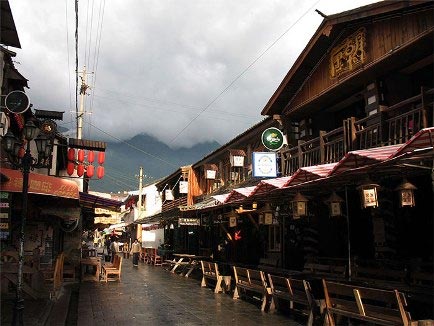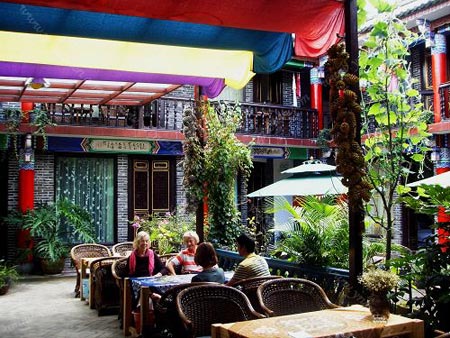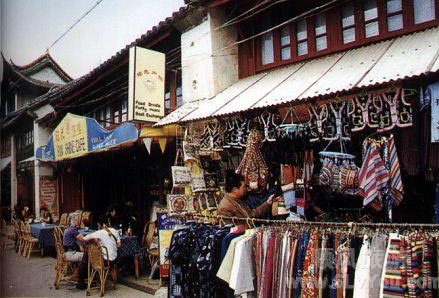When I got to Xiaguan, the sun was already setting. I hopped on the number four bus and got to the old city for one and a half RMB. This is the fastest and the cheapest way to get there. The wind brushes my cheeks and the rays of the setting sun still illuminated the land, giving the trees and the fields a golden hue. The fresh, clean air makes everything feel especially real, but the real Dali is not here: it is still to the east on the shores of Erhai Lake.

Dali, Yuan, photo: Sina.com.cn
No city quite compares with Dali, so it is no wonder that visitors are easily taken in by its mystery and charm. She lives at her own, relaxed pace. Locals only make up about half the population. The rest of the town is filled with outsiders who have come to breathe in the city’s energy. The two groups coexist easily, and it’s hard to tell which is which. You can gaze at the beauty of the Cangshan Mountains as you listen to local blues music. The older generation stays crouched at the foot of the city wall chatting about this and that, aging slowly. Passers-by and returnees have their differences, but everyone who comes to this city shares the same fantasy: to be swept away in the magic of a different land. Through this dream we are joined with the locals as distant relatives visiting for the first, second, or hundredth time.
Dali, like tourist destinations Lijiang, Yangshuo, and Fenghuang, is filled with hotels and hostels. But unlike Yangshuo, there is more than one good place to stay and unlike Lijiang, Dali’s tourists have expelled the locals. In this respect, Dali has more of an authentic feel to it than other small, ancient cities. Fenghuang is even worse. Now the once pristine village is overrun with street vendors clamorously pushing their wares on ever-increasing number of tourists. In Dali, however, you’ll find yourself wrapped up in a local culture.

A Hostel in Dali, Yunan
But a passerby is always a passerby. No matter what one does, a visitor will never completely belong. The owner of the hotel I stayed in had lived in Dali for over ten years, but still feels like he is on a visit from Guangdong, his home. Despite this, his feelings for the ancient city run deep; he thinks of Dali as one would think of one’s wife. Whether you’ve lived in Dali for a long time or are just visiting briefly, the city will make a deep impression on you. You may never feel the same way about it as you do your hometown, but Dali will always be a special place.
Si Zi’s hostel, where I stayed, isn’t one of those flashy, famous hotels. Located on Renmin Road right next to an old courtyard, Si Zi’s hostel is both comfortable and convenient. Si Zi’s Dali story is a love story of sorts. Several years ago, Si Zi was passing through Dali on the way to Lijiang. He decided to stay a little longer and ended up here for three months. Si Zi went back to Guangdong, quit his job and then packed up everything owned and brought it to Dali. At first he ran an Indian-style craft shop and later he opened this hostel. Si Zi hand-painted the unique designs on every wall of the hostel. “Why did you decide on Dali of all places?” I asked him. “This is a type of place,” he responded, “where life goes by so slowly and peacefully, you don’t feel like you miss anything.”
The ancient city is actually very small and full almost entirely of narrow streets. There are almost no cars and not even many people ride bicycles. The locals can immediately tell someone on a bike is certainly not from Dali because they walk everywhere. There are no car horns or other unseemly noises. People from Dali wander to and fro in a slow, laid back manner.

Dali Foreigners' Street, photo: 6lvyou.com
Renmin Road is just a couple of blocks away from Foreigner’s Street, the place where most new comers congregate. Although these two roads are only separated by a wall, they have totally different styles. The bustling Foreigner’s Street is full of bars, restaurants, schools, old courtyards and street vendors. All travelers to Dali spend some time on this street and the loud squeak of their hiking boots mixes happily with the shuffling cloth shoes the locals wear. In the afternoon, ancient teahouses will set up tables alongside the thin canals that run through the city. Tourists and locals alike spend their time playing mahjong in the shade of towering willows. As I sat around the table, the sun began to set behind the vibrant Cangshan Mountains and colors grew darker throughout the city.
Another interesting thing about Dali is the local markets in the surrounding villages. Everyday one of the villages sitting on the banks of Erhai Lake holds a market selling anything from shoes to fencing. The boisterous markets are all just a bus-ride away and each boasts its own flavor and minority culture. For this reason, Dali isn’t just a cultural center; it’s a gate through which you can experience the richness and beauty of Yunnan.
***
Related links:
China Explorer> Airport Security Fun
China Explorer> A World in Heaven — Jiuzhaigou
China Explorer> Buddhist Mountain - Enchanted Wutaishan
China Explorer> Lost in Face?
Warning’╝ÜThe use of any news and articles published on eChinacities.com without written permission from eChinacities.com constitutes copyright infringement, and legal action can be taken.
All comments are subject to moderation by eChinacities.com staff. Because we wish to encourage healthy and productive dialogue we ask that all comments remain polite, free of profanity or name calling, and relevant to the original post and subsequent discussion. Comments will not be deleted because of the viewpoints they express, only if the mode of expression itself is inappropriate.
Please login to add a comment. Click here to login immediately.